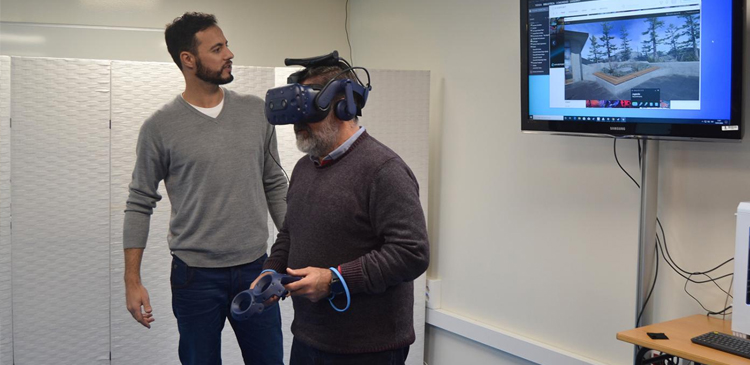Physiotherapist and researcher Pablo Campo participates in another study with this tool. «We didn’t want Covid to stop us cold,» he says.
Pontevedra university campus researcher Pablo Campo has been working for a couple of years on the use of immersive virtual reality to improve functional ability in senior citizens. How? Through ‘exergaming’, which are games created for exercising. The physiotherapist, who specialises in Parkinson’s neurorehabilitation, designed a specific programme whose results were to be presented at various conferences, including, an international event that was going to be held in Malaga last March. The event never took place as it coincided with the weekend when the first lockdown began.
Pablo says that this study was finally released, virtually, on 14th November. Nine patients from the Parkinson’s Association of Vigo had participated in the pilot test with an immersive (not augmented) total virtual reality headset and to complete it an authorised clinical trial was planned in a private residential centre in Pontevedra: Saraiva Senior. “We had everything ready to start, but the residences and day centres were shielded because of Covid and to see how the vaccine evolves. We are confident that we will be able to launch it in the first quarter of 2021”, explains the researcher from the HealthyFit group, from the Faculty of Education and Sports Science.
Can it alter stress levels?
As this study could not go ahead, they took advantage of this period to perform another investigation. This is a study that seeks to determine if the use of virtual reality for exercise can alter stress levels. “We wanted to ensure that Covid did not stop experimental research in people entirely. So, we conducted a small trial with people close to the campus», says Pablo Campo.
33 people eventually participated in this study, including students, especially from the Faculties of Education Sciences and Physiotherapy, professors and administration and services personnel. “Physical exercise always relieves stress. But we wanted to know what happens with a new immersive virtual reality platform,” he says. Previously, the security measures of the tool were shielded so that the process was safe and the different phases were carried out under strict protocols to combat the spread of Covid-19. The field phase of the study is now complete and the HealthyFit group is working on the data analysis.
Pablo Campo emphasises that the objective of the study is to evaluate the alterations in stress levels that the use of virtual reality can produce, to develop a physical activity programme. This is done using two biomarkers, the hormone cortisol and the enzyme alpha-amylase. Participants were monitored for blood pressure and heart rate, taking several saliva samples when getting up, before the activity and after exercise. The study is completed with a control group from which three samples will also be taken. The physiotherapist points out that the saliva samples from the two groups will be analysed with a high-efficiency chromatograph (HPLC) in the Escola de Forestais laboratories by researcher Carlos Souto.
«Within our area of research, we control exertion through tension and heart rate. We don’t want it to be excessive as we are going to apply it to more frail groups», points out Pablo Campo. This researcher reveals that the mask factor was also taken into account. Wearing a mask when performing physical exercise places greater demands on the individual, requiring increased effort. Depending on the type of mask, this can be more or less of a factor. The physiotherapist emphasises that, whilst wearing a mask is recommended from a general health point of view, its use in certain groups such as people with respiratory issues or the very elderly, is not recommended as it increases cardiac stress.








 A Project Manager is a professional capable of advising: Promoters, Companies, Sponsors, etc. on the development of projects and various operations, managing them, directing and coordinating the stakeholders. A task that will be carried out from the conception of the Project to the delivery of the product or the service to the user, complying with the client’s requirements, so that the operation is completed on time, on budget and respecting the established quality levels. Within our university postgraduate programme, the highest specialisation applied to Design, Management and Project Control is the
A Project Manager is a professional capable of advising: Promoters, Companies, Sponsors, etc. on the development of projects and various operations, managing them, directing and coordinating the stakeholders. A task that will be carried out from the conception of the Project to the delivery of the product or the service to the user, complying with the client’s requirements, so that the operation is completed on time, on budget and respecting the established quality levels. Within our university postgraduate programme, the highest specialisation applied to Design, Management and Project Control is the 